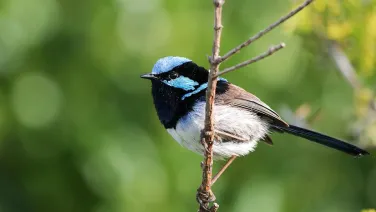News & events
News & events
Find out about our latest news and events.

We may be in the middle of an insect mass extinction. The once abundant Rocky Mountain locust was last seen in 1902. Under the Mikheyev Group, Peiyu Yuan used data from a related extant locust species and comparative genomics to identify artifacts in museum data of the Rocky Mountain locust.

Researchers from the Australian National University (ANU) have discovered several new species of butterflies and moths in Northern Australia, identifying a conservation stronghold of national and international significance.

Seaweed plays an important role in coral reef biodiversity, with an important role in the lifecycle of several fishes.

Alexandra Catling indulges in her passion for scientific research on a trip to south east Asian forests. And discovers leeches.

Fairy wrens can learn to recognise the alarm calls of other species.

The amazing diversity we see in Australian animal developed early and has slowed considerably in the last 10 million years, say Ian Brennan and Scott Keogh from the ANU Research School of Biology.

Workshop online webinar over 4 days:
Monday 2nd November 4-6pm
Tuesday 10th November 4-6pm
Monday 16th November 4-7pm
Monday 23rd November 3-7p
The cross-kingdom mimicry of female insect sex pheromones by sexually deceptive orchids has fascinated evolutionary biologists ever since the importance of chemistry in pollination by sexual deception was first recognised.

Workshop online webinar over 4 days:
Monday 2nd November 4-6pm
Tuesday 10th November 4-6pm
Monday 16th November 4-7pm
Monday 23rd November 3-7p
Any antagonistic interaction has the potential of favouring sex, just as predicted by the "Red Queen hypothesis" in the case of host-parasite interactions. Is it really the case?
Reproductive success is strongly related to the display of extravagant sexual traits, such as the striking coloration of some bird species.
Ecological stressors such as predation can shape ecosystems, driving prey population and community dynamics through indirect, non-consumptive effects that may cascade across generations through parental effects.